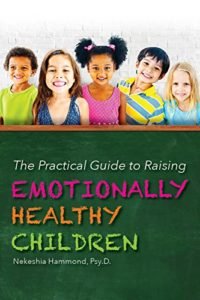Today we are excited to bring you Dr. Nekeshia Hammond. She is a psychologist, speaker, author, and owner of Hammond Psychology &  Associates. She is the 2017 President of the Florida Psychological Association, and she also serves on the Board of Directors for the Ryan Nece Foundation. Dr. Hammond is honored to consult with the media to increase public education about mental health issues. She has been featured on NBC, ABC, and CBS, as well as various magazines and radio shows throughout the country. She is the author of A Practical Guide to Raising Emotionally Healthy Children to help parents on their journey to improve the lives of their children.
Associates. She is the 2017 President of the Florida Psychological Association, and she also serves on the Board of Directors for the Ryan Nece Foundation. Dr. Hammond is honored to consult with the media to increase public education about mental health issues. She has been featured on NBC, ABC, and CBS, as well as various magazines and radio shows throughout the country. She is the author of A Practical Guide to Raising Emotionally Healthy Children to help parents on their journey to improve the lives of their children.
What was your entry point to Entrepreneurialism?
My first experience with entrepreneurialism was when I began my private practice in 2009. Although I had extensive preparation in graduate school of how to treat patients with mental health issues, I never had any formal training in the business world. I found myself “thrown into the fire” and had to learn a lot of business management skills with the help of great mentors, workshops, and consultants after graduate school.
Can you recall a time or event when you caught the bug to be an entrepreneur?
When I first started my private practice, I took a huge risk, which is familiar to many other entrepreneurs. I was VERY afraid of failure, I would think to myself: what if I can’t sustain a steady income with my own business? Do I really know how to market? How can I do this when I have never had a business?. Even with all of the doubt and uncertainty and being fresh out of graduate school, I decided to take a few thousand dollars I saved up from an additional part-time job (on top of my full-time residency) and put into starting my business. I intended for the money to be used towards my family’s first house, but instead took the risk of starting my own business. It was really scary, but I’m obviously really glad I went through with it.
Tell us about your rise from green entrepreneur to where you are now?
In 2009, I felt like a “green entrepreneur” barely understanding the world of business. Since that time, I’m happy to be more knowledgeable about networking, community involvement, and growing a business. I’ve had opportunities to work with the national and local media outlets, impact my local community, and expand the business into what it is today: Hammond Psychology & Associates. I started out in a one-office space back in 2009 where I was the only employee doing virtually everything. Our office has now grown to expand the team and I’ve truly learned that it takes a team to be successful (from our receptionist, accountant, psychologists, graphic designer, editor, business consultants, and more). I’m still learning, but grateful to be successful in business for almost 9 years.
What was the crossover point from “I’m going to be” to “I am” an entrepreneur?
The crossover point was when there was a mental shift for me into really thinking of myself as being an entrepreneur was in 2011 when I decided on expanding the practice. Moving locations in 2012 into my own space and starting the first expansion (moving from the 1 office place to the 4 office place) was a pivotal point in my business. Then in 2015, we moved again (to our current 7 office location) which again changed my mindset. I would definitely saw the good, bad, and the ugly of expanding a business really lets you know that you are now an official entrepreneur. In addition to expanding the practice, I’m currently working on other projects and services to further serve families, which is very exciting.
What are you finding to be the biggest or most common problem with parents?
The parents I serve struggle most with understanding how to best help their children. Many parents are concerned about warning signs that their child might be in trouble, whether academically, socially, emotionally, or otherwise. They simply want the best for their child, but the issues have gotten to the level where they seek a psychological evaluation to better understand what their child is going through and what interventions need to be in place.
What is the most common “Do It Yourself” solution your prospects might try?
Many parents find that improving the structure, organization, and routines at home can help with ADHD. Parents have also found that advocating for their child within the school system can also make a world of difference in the life of their child with ADHD or a learning disability. There are federal laws which require children with certain conditions to receive modifications in the classroom, and when parents understand the rights their child have, it becomes an easier process for many children and families.
What would you say is your magic?
I think my magic really shines through because I love what I do. I have been working with children and families for almost a decade in private practice has been an incredibly rewarding experience. In my recent book The Practical Guide to Raising Emotionally Healthy Children with parents to help them through the journey of parenthood. I’m also very excited about my new upcoming book in the works right now to help parents with children with ADHD.

